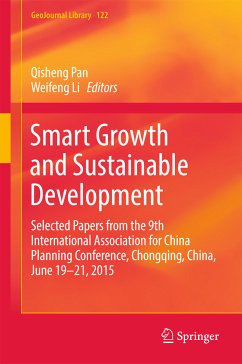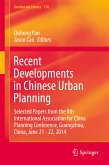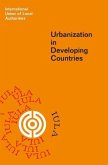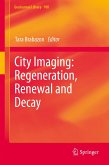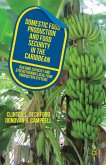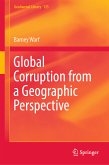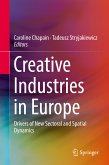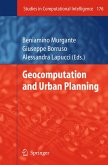Smart Growth and Sustainable Development (eBook, PDF)
Selected Papers from the 9th International Association for China Planning Conference, Chongqing, China, June 19 - 21, 2015
Redaktion: Pan, Qisheng; Li, Weifeng


Alle Infos zum eBook verschenken

Smart Growth and Sustainable Development (eBook, PDF)
Selected Papers from the 9th International Association for China Planning Conference, Chongqing, China, June 19 - 21, 2015
Redaktion: Pan, Qisheng; Li, Weifeng
- Format: PDF
- Merkliste
- Auf die Merkliste
- Bewerten Bewerten
- Teilen
- Produkt teilen
- Produkterinnerung
- Produkterinnerung

Hier können Sie sich einloggen

Bitte loggen Sie sich zunächst in Ihr Kundenkonto ein oder registrieren Sie sich bei bücher.de, um das eBook-Abo tolino select nutzen zu können.
This book explores how to tackle the challenges of urbanization through international lessons in sustainable development and smart growth strategies. As readers will discover, smart growth offers an approach to urbanization with the aim to: improve the efficiency of land use, protect the natural and cultural environment, promote economic prosperity and improve the quality of life. Authors address various challenges experienced in China, including deepening regional imbalances, an aging population, wholesale environmental degradation and traffic congestion. China's official long-term…mehr
- Geräte: PC
- ohne Kopierschutz
- eBook Hilfe
- Größe: 10.64MB
![Recent Developments in Chinese Urban Planning (eBook, PDF) Recent Developments in Chinese Urban Planning (eBook, PDF)]() Recent Developments in Chinese Urban Planning (eBook, PDF)73,95 €
Recent Developments in Chinese Urban Planning (eBook, PDF)73,95 €![Urbanization in Developing Countries (eBook, PDF) Urbanization in Developing Countries (eBook, PDF)]() Martinus NijhoffUrbanization in Developing Countries (eBook, PDF)40,95 €
Martinus NijhoffUrbanization in Developing Countries (eBook, PDF)40,95 €![City Imaging: Regeneration, Renewal and Decay (eBook, PDF) City Imaging: Regeneration, Renewal and Decay (eBook, PDF)]() City Imaging: Regeneration, Renewal and Decay (eBook, PDF)73,95 €
City Imaging: Regeneration, Renewal and Decay (eBook, PDF)73,95 €![Domestic Food Production and Food Security in the Caribbean (eBook, PDF) Domestic Food Production and Food Security in the Caribbean (eBook, PDF)]() C. BeckfordDomestic Food Production and Food Security in the Caribbean (eBook, PDF)73,95 €
C. BeckfordDomestic Food Production and Food Security in the Caribbean (eBook, PDF)73,95 €![Global Corruption from a Geographic Perspective (eBook, PDF) Global Corruption from a Geographic Perspective (eBook, PDF)]() Barney WarfGlobal Corruption from a Geographic Perspective (eBook, PDF)113,95 €
Barney WarfGlobal Corruption from a Geographic Perspective (eBook, PDF)113,95 €![Creative Industries in Europe (eBook, PDF) Creative Industries in Europe (eBook, PDF)]() Creative Industries in Europe (eBook, PDF)81,95 €
Creative Industries in Europe (eBook, PDF)81,95 €![Geocomputation and Urban Planning (eBook, PDF) Geocomputation and Urban Planning (eBook, PDF)]() Geocomputation and Urban Planning (eBook, PDF)113,95 €
Geocomputation and Urban Planning (eBook, PDF)113,95 €-
-
-
Dieser Download kann aus rechtlichen Gründen nur mit Rechnungsadresse in A, B, BG, CY, CZ, D, DK, EW, E, FIN, F, GR, HR, H, IRL, I, LT, L, LR, M, NL, PL, P, R, S, SLO, SK ausgeliefert werden.
- Produktdetails
- Verlag: Springer International Publishing
- Seitenzahl: 259
- Erscheinungstermin: 31. Dezember 2016
- Englisch
- ISBN-13: 9783319482965
- Artikelnr.: 53034254
- Verlag: Springer International Publishing
- Seitenzahl: 259
- Erscheinungstermin: 31. Dezember 2016
- Englisch
- ISBN-13: 9783319482965
- Artikelnr.: 53034254
- Herstellerkennzeichnung Die Herstellerinformationen sind derzeit nicht verfügbar.
ation of Tanhualin Community in Wuhan (Liang Guo).- Chapter 8. Analysis on Spatial Impact Factors of Poverty and Its Planning Suggestions: A Case Study of Guizhou Counties (Zhengxu Zhou).- Chapter 9. Big Data and Urban Traffic Management (Jia Chen).- Chapter 10. Research for Increasing FCD Map Matching Accuracy Based on Feature Extraction of Continuous Traffic Flow and Interrupted Traffic Flow (Zhiping Zhang).- Chapter 11. Green Transportation Planning Strategy of Mountain city - A Case of Anshun City, Guizhou (Jia Chen).- Chapter 12. Visual Impact Analysis and Control Method of Building Height for Landscape Preservation of the Traditional Gardens: A Case Study on Landscape Preservation of the Suizen-ji J ju-en in Kumamoto City (Li Lin).- Chapter 13. Satisfaction Level of Elderly People's Life in Urban Communities Based on the Status of Internet Usage - A Survey Covering Different Types of Communities in Xi'an (Liuchangyue Li).- Chapter 14. Study on Characteristics and Policy Recommendations of Small Towns in the View of Regional Development Strategy in Coastal Area of Jiangsu Province, China (Shuping Cui).- Chapter 15. Space Design of Slow Mode Transportation System of Mountainous City (Yong Huang).- Chapter 16. Participatory Governance and Challenges of Situated Informalities in the Developing Countries (Md Masud Parves Rana).- Chapter 17. Combined Commuting Mode For Residents In Big Cities By Healthy View - A Case study of Xi'an ( Zirui Lyu). - Chapter 18. Problem Analysis of Urban-rural Industrial Land Use in the Metropolitan Areas under the New Urbanization Policy-The Case Study of Shanghai (Fan Yang).- Chapter 19. The Urban Design Strategy of Chongqing Special Steel Industrial Site in the Process of Rapid Urbanization (Qi Zhang).- Chapter 20. Following Natural Features-The Planning Method Research on Spatial Arrangement of Blue-Green Web Around Urban Core Area (Zhong Xing).- Chapter 21. A Comparative Study on the Evolution of Greenbelts in London and Beijing (Mingfei Ma).- Chapter 22. Land Smart Growth and Sustainable Development: A Study of Implementation-based Innovational Country Unit Planning in Shanghai (Jianqing Lai).- Chapter 23. Urban Spatial Cultural Structure Analysis: Based on the Empirical Study on Shanghai Xintiandi and Chongqing Xintiandi (Ling Hunag).- Chapter 24. From Margin to Center: Study on Central City Development Strategy in Qinling-Bashan Hinterland Areas (Qi Yu).
ation of Tanhualin Community in Wuhan (Liang Guo).- Chapter 8. Analysis on Spatial Impact Factors of Poverty and Its Planning Suggestions: A Case Study of Guizhou Counties (Zhengxu Zhou).- Chapter 9. Big Data and Urban Traffic Management (Jia Chen).- Chapter 10. Research for Increasing FCD Map Matching Accuracy Based on Feature Extraction of Continuous Traffic Flow and Interrupted Traffic Flow (Zhiping Zhang).- Chapter 11. Green Transportation Planning Strategy of Mountain city - A Case of Anshun City, Guizhou (Jia Chen).- Chapter 12. Visual Impact Analysis and Control Method of Building Height for Landscape Preservation of the Traditional Gardens: A Case Study on Landscape Preservation of the Suizen-ji J ju-en in Kumamoto City (Li Lin).- Chapter 13. Satisfaction Level of Elderly People's Life in Urban Communities Based on the Status of Internet Usage - A Survey Covering Different Types of Communities in Xi'an (Liuchangyue Li).- Chapter 14. Study on Characteristics and Policy Recommendations of Small Towns in the View of Regional Development Strategy in Coastal Area of Jiangsu Province, China (Shuping Cui).- Chapter 15. Space Design of Slow Mode Transportation System of Mountainous City (Yong Huang).- Chapter 16. Participatory Governance and Challenges of Situated Informalities in the Developing Countries (Md Masud Parves Rana).- Chapter 17. Combined Commuting Mode For Residents In Big Cities By Healthy View - A Case study of Xi'an ( Zirui Lyu). - Chapter 18. Problem Analysis of Urban-rural Industrial Land Use in the Metropolitan Areas under the New Urbanization Policy-The Case Study of Shanghai (Fan Yang).- Chapter 19. The Urban Design Strategy of Chongqing Special Steel Industrial Site in the Process of Rapid Urbanization (Qi Zhang).- Chapter 20. Following Natural Features-The Planning Method Research on Spatial Arrangement of Blue-Green Web Around Urban Core Area (Zhong Xing).- Chapter 21. A Comparative Study on the Evolution of Greenbelts in London and Beijing (Mingfei Ma).- Chapter 22. Land Smart Growth and Sustainable Development: A Study of Implementation-based Innovational Country Unit Planning in Shanghai (Jianqing Lai).- Chapter 23. Urban Spatial Cultural Structure Analysis: Based on the Empirical Study on Shanghai Xintiandi and Chongqing Xintiandi (Ling Hunag).- Chapter 24. From Margin to Center: Study on Central City Development Strategy in Qinling-Bashan Hinterland Areas (Qi Yu).
